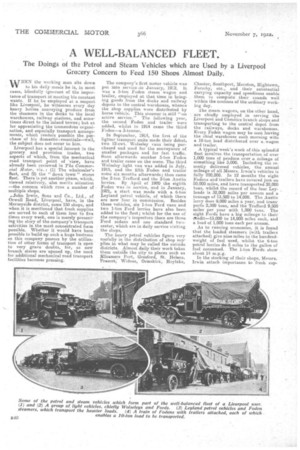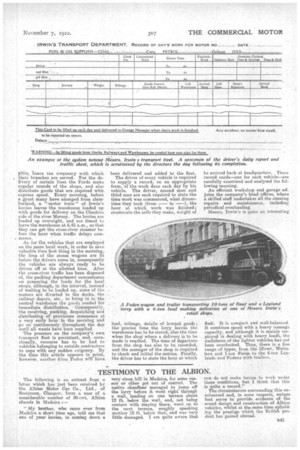A WELL-BALANCED FLEET.
Page 24

Page 25

If you've noticed an error in this article please click here to report it so we can fix it.
The Doings of the Petrol and Steam Vehicles which are Used by a Liverpool Grocery Concern to Feed 150 Shoes Almost Daily.
vvFEN the working man sits down to his daily meals he is, in most eases, blissfully ignorant of the importance of transport is meeting his constant wants. If he be employed at a seaport like Liverpool, he witnesses every day heavy lorries conveying produce from the steamers in the docks to the local warehouses, railway stations, and sometimes direct to the inland towns; but as for appreciating the tremendous organization, and especially transport arrangements, which renders possible the purchase of his domestic. essentials—well, the subject does not occur to him.
Liverpool has a special interest in the grocery. and provision trades, two aspects of which, from the mechanical road transport point of view, have already been reviewed in The Commercial Motor, viz. : (1) The wholesaler's fleet, and t2) the " down town " stores fleet. There is yet another phase, which, viewed relatively, also merits attention —the concern which runs a number of multiple shops.
,-John Irwin, Sons and Co., Ltd., of Orwell Road, Liverpool, have, in the Merseyside district, some 150 shops, and when it is mentioned that fresh supplies are served to each of them four to five times every week, one is merely presenting the story of the company's transport activities in the most concentrated form possible. Whether it would have been possible to build up such a huge business as this company possess by the utilization of other forms of transport is open to very grave doubts, for, as new branch stores are opened up, the need for additional mechanical road transport facilities becomes pressing. The company's first motor vehicle was put into service .in January, 1912. it was a 5-ton Foden steam wagon and trailer, employed at that, time in bringing goods from the docks and railway depots to the central warehouse, whence the shop supplies were distributed by horse vehicle. This steamer is still "on active service." The following year, the second • Foden and trailer were added, whilst in 1914 came the third Foden—a 3-tonner.
In September, 1914, the first of the lightertransport units made their debut, two 12-cwt. Wolseley vans being purchased and used for the conveyance of smaller packages and for fast traffic. Soon afterwards another 5-ton Foden and trailer came on the scene. The third Wolseley light van was added in July, 1915, and the fifth Foden and trailer some six months afterwards; then came the 2-ton Trafford and the 3-ion Austin lorries. By April of 1920 the eighth Yodels was, in service, and in January, 1921, a start was made with a 6-ton Leyland petrol vehicle, of which there are now four in commission. Besides these vehicles; six 1-ton Ford vans and two 1-ton Ford lorries have also beers added to the fleet ; whilst for the use of the company's inspectors there are three Ford sedans and one standard twoseater, which are in daily service visiting the shops.
The heavy petrol vehicles figure very usefully in the distribution of shop supplies in what may be called the outside districts. Almost daily their work takes them -outside the city to places such as Ellesmere Port, Gresford, St. Helens, Prescot; Widnes, Ormskirk, Hoylake, Chester, Southport, Moreton, Hightown. Formby, etc., and their substantial carrying capacity and speediness enable them to complete their rounds well within the confines of the ordinary working day.
The steam wagons, on the other hand, are chiefly employed in serving the Liverpool and Cheshire branch shops and transporting to the central depot from the railways, docks and warehouses. Every Foden wagon may be seen leaving the chief warehouse each morning with a 10-ton load distributed over a. wagon and trailer.
A tYpical week's work of this splendid fleet involves the transportation of over 1,000 tons of produce over a mileage of something like 3,000. Including the recently delivered vehicles, the annual mileage of all Messrs. Irwin's vehicles is fully 220,000. In 12 months the eight Fodens and trailers have covered just on 50,000 miles, and have transported 30,000 tons' whilst the record of the four Leylands is 32,000 miles per annum and a tonnage of 13,500 to 14,000. The Austin lorry does 9,000 miles a year, and transports 2,300 -tons, and the Trafford 9.500 miles per year with 1,800 tons, the eight Fords have a big mileage to their dtedit-13,000 to 14,000 miles each, and a load of 1,000 tons each per annum.
As to running economies, it is found that the loaded steamers (with trailers attached) give nine miles to the hundredweight of fuel used, whilst the 6-ton petrol lorries do 5 miles to the gallon of fuel consumed. The 1-ton Fords show about 14 m.p.g.
In the stocking of their shops, Messrs. Irwin attach importance to fresh sup
hence the frequency with which their branches are served. For the delivery of certain lines the Fords make regular rounds of the shops, and also distribute goods that are required with. express speed. Every morning, before a great many have emerged from slumberland, a "motor train" of Irwin's lorries leaves the warehouse loaded up with goods for delivery on the Cheshire side of the river Mersey. The lorries are -loaded up overnight, and are timed to leave the warehouse at 6.45 a.m., so-that they can get the cross-river steamer before the hour when traffic delays commence.
As for the vehicles that are employed on the more local work, in order to save valuable time first thing in the morning, the fires of the steam wagons are lit before the drivers come in, consequently the vehicles are always ready to be driven off at, the allotted time. After the cross-river traffic has been disposed of, the packing department concentrates on preparing the loads for the local shops, although, in the interval, instead . of waiting to be loaded up, some of the motors are diverted to the docks, the railway depots,' etc., to bring in to the central warehouse the goods needed for immediate distribution. Consequently, the receiving, pecking, despatching and distributing of provisions commence at a very early hour in the morning and go on continuously throughout the day until all wants have been supplied.
The pressure on the company's own transport fleet is persistent, and, occasionally, recourse has to be had to vehicles belonging to outside contractors to cope with any sudden exigency. By the time this article appears in print, however. another 6-ton Foden will Wave.
been delivered and added to the fleet.
The driver of every vehicle is required to supply a record, on an appropriate form, of the work done each day by his vehicle. The driver, second man and third man are each required to state the time work was commenced, what dinnertime they took (from — to —), the hour at which work was finished; enumerate the calls they make, weight of
load, mileage, details of inward goods; the precise time the lorry leaves the warehouse has to be stated, also the time when the shopwhere a delivery is to be made is reached. The time of departure from the shop has also to be recorded, and the manager of the shop is required to check and initial the entries. Finally, the driver has to state the hour at which
he arrived back at headquarters, These record cards—one for each vehicle—are carefully examined and analysed the following morning. An efficient workshop and garage adjoins the company's head offices, where a skilled staff undertakes all the running repairs and maintenance, including periodical overhauling. Messrs. Irwin's is quite an interesting' fleet. It is compact and well-balanced. It combines speed with a heavy tonnage capacity, and although it is mainly employed in dealing with heavy loads, the usefulness ,of the lighter vehicles has not been overlooked. Thus, there is a fine range of types, from the 12-cwt. Wolseleys and 1-ton Fords to the 6-ton Leylands and Fodens with trailers.
































